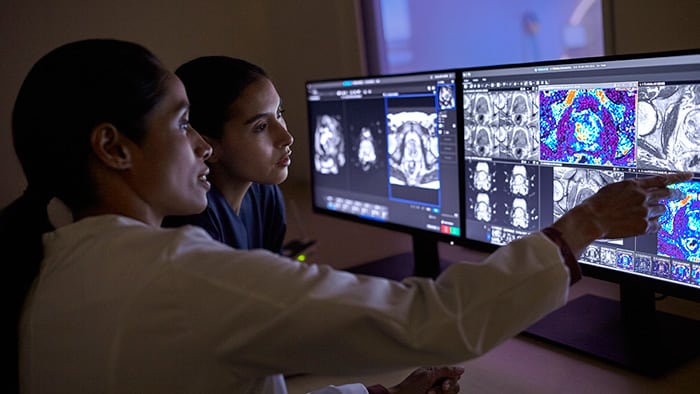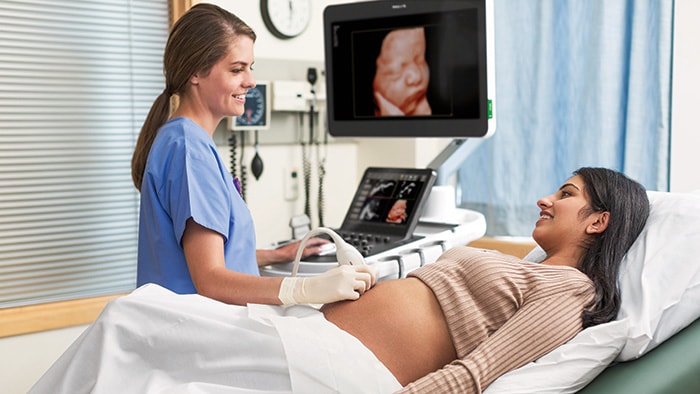At this year’s International Society for Magnetic Resonance in Medicine Annual Meeting (ISMRM), which just wrapped in London last week, Philips showcased its new innovative MRI portfolio with smart connected imaging, smart workflows and integrated clinical solutions. Front and center at ISMRM was the company’s latest smart connected 3T MR system, the MR 7700, an industry-first, fully integrated multi-nuclei imaging and spectroscopy solution to explore new clinical pathways without sacrificing clinical imaging workflow or wide-bore patient comfort. Also featured at ISMRM was the company’s latest and recently FDA 510(k) cleared AI-enabled Philips SmartSpeed technology, and smart workflow solutions.
To highlight the opportunities these latest innovations bring to precision diagnostics and clinical research – and how they stimulate new clinical partnerships to shape the future of MR – the company hosted several events during ISMRM 2022. Sessions included a multi-nuclei imaging and spectroscopy-focused user meeting; an MR in neuroscience meeting; and a symposium featuring the new MR7700 system, with feedback from first of kind customers on how the advanced technology is delivering unmatched performance and precision for research and advanced clinical diagnostics to help improve outcomes. Visit Philips at ISMRM 2022 for a recap of highlights from the event. During the symposium, the new MR 7700 with its multi-nuclei MR imaging solution drew large interest from ISMRM attendees due to its plug and play features to help both researchers and clinicians in areas such as high-quality diffusion imaging and advanced neurology.
“I want to thank Philips for listening to the community because they made the MR system that allows us to do Multinuclear studies easily. In an exam card, you can easily select the Nuclei you want. It is not just limited to proton; it is supported for non-proton coils which are easy plug and play coils. With this technology, the future is bright allowing for the easy extension of current clinical workflow to multinuclear studies targeting early pathophysiology and intervention.” - Glenn A Walter, Ph.D., Professor of Physiology, University of Florida, U.S.A.
Recognizing that clinicians and researchers need powerful workflow solutions as well as technological imaging capabilities, Philips also showcased its deep learning reconstruction technology - Philips SmartSpeed - to deliver speed and image quality without compromise and its productivity enhancing new user interface MR Workspace and SmartWorkflow solutions.
“Our Precision Diagnosis mission to connect solutions into clear care pathways resonated very well with the ISMRM audience, especially as our mission offers ample opportunity to collaborate with other health tech leaders. Innovations that combine smart systems, improve workflow (including how to address staff shortages and enhance patient experience) and deliver better outcomes are important building blocks in our strategy. The MR7700 offers the flexibility to shift from clinical diagnosis to scientific investigations. Making things easy while solving complex patient cases is the way forward.” - Arjen Radder, General Manager of Magnetic Resonance and Diagnostic X-ray at Philips.
Philips SmartSpeed receives FDA 510(k) clearance
Powered by Philips’ Compressed SENSE acceleration engine and an award-winning AI algorithm applied directly at the MR reconstruction chain, Philips SmartSpeed, now with 510(k) clearance from the FDA, delivers fast high-quality imaging for a wider range of patients including patients who are in pain, who struggle to hold their breath during the exam, or who have MR-conditional implants. SmartSpeed supports 97% of current clinical MR protocols and all anatomies [1]. By scanning up to three times faster [2] and helping to reduce the total exam time, Philips SmartSpeed can increase MRI department productivity and reduce the cost per exam. It uses a maximum amount of data to provide outstanding image quality with 65% higher resolution [2] to help increase the confidence of radiologists when providing information to a referring physician.
MR Workspace
MR Workspace, which also leverages AI technology, simplifies the path from image acquisition to diagnosis, helping to improve MR workflows, enhance the staff experience, and drive productivity and predictability. Its intuitive dashboard fully automates the planning and execution of many routine scans and eliminates guesswork by suggesting the most suitable Exam Card for each patient, helping to ensure consistency in radiology department operations and simplify technician training. Many standard protocols can be run fully automatically.
SmartSpeed and MR Workspace, together with Philips’ AI-based touchless patient sensing and SmartExam automated exam planning software, combine in its SmartWorkflow MR productivity platform, allowing the consistent use of AI throughout the MR workflow, from pre-scanning to reconstruction. The resulting departmental productivity and efficiency improvements enable staff to focus more on their patients.
These newest MR innovations are part of the Philips Radiology portfolio of smart connected MR systems, including its latest MR 5300 1.5T helium-free in operations MR system, all of which feature intelligent software to automate tasks to help relieve the burden on busy radiology staff and departments. Philips Radiology portfolio delivers patient-centered solutions to reduce anxiety and discomfort; technologist- and radiologist-centered image processing applications for clinical and diagnostic confidence; and enterprise-integrated workflows that streamline the path to precision care.
[1] On average, measured across a sample of sites from Philips MR installed base
[2] Compared to Philips SENSE
Share on social media
Topics
Contact

Kathy O'Reilly
Philips Global Press Office Tel.: +1 978-221-8919
You are about to visit a Philips global content page
Continue












